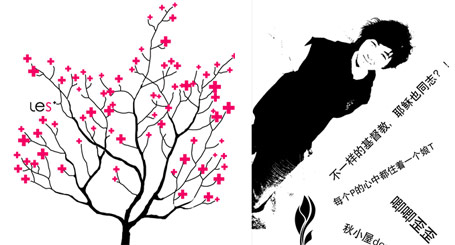Mama Cash, a Dutch women's empowerment organisation, celebrated International Women's Day over the weekend by announcing the prize winners for their 5,000 euro (US$7,682) "she changes the world" awards. Kudos to Common Language (同语), a Beijing-based lesbian support group, for being one of the winners and the only lesbian group to win an award; the other recipients are general women's groups around the world. Fridae asked Xian, the founder of Common Language, what she is planning to spend the money on.
"We want to donate it to set up a China lala [local slang for lesbian] Fund to help more women, more lesbian and bisexual women not only in Beijing but in other cities and even in remote places to have more community and cultural-related activities," said an obviously happy Xian. "We want to empower the lesbian community in general."
The award is part of a wider initiative from Mama Cash called "Campaign 88 Days" which aims to drum up interest and money into projects supporting women. "We really love that idea and we want to use this Lala fund to be like that, to get into fund raising to support itself."
It's not big bucks, but 5,000 euros can go a long way in China.
Since it started back in 2005, it's not been easy for Common Language to raise money. "For almost the first two years we didn't apply and had little general support - all of us were volunteers, although we did get some funding for certain projects," said Xian.
Some foreign organisations aren't willing to donate money because Common Language is not registered as an NGO in China.
"Many international organisations require us to be registered to get grants," she says. She cited one German group that refused them a grant on the basis that they weren't registered as an NGO in China.
Common Language is an unofficial group that because of its small size and its non-political nature, has largely escaped the attention of the authorities. Registering as a non-governmental organisation in China is fraught with difficulties and limitations.
"We don't want to register as an NGO because then we would have to be connected to the government. All NGO's in China are government related, the government has to know everything you're doing, they have to agree to all your projects, it is like a censorship," Xian explains.
Aizhixing (爱知行动), an Aids/HIV prevention group in Beijing, which also supports LGBT activities and promotes human rights, has registered as an enterprise with the authorities which gives them a semi-official status. Because of the sensitive nature of their work, they intermittently face hassles with authorities.
"We could probably do the same," muses Xian, "as long as we didn't say we were a lesbian group."
In fact they've done something better. Just last month, Common Language, Aizhixing, gay news website Aibai (爱白) and Les+, a free to pick up lesbian magazine grouped to together and registered under an umbrella company called taohong (桃红, peach-red or another word for pink). They've rented an office space in the southwest of the city and are preparing to open it as a gay culture and activity centre.
"This is one of the reasons why we set up [taohong]," said Xian. "Now we have more chances to qualify for grants and we can minimise administration overheads," as taohong can do some of the office work.
For Common Language, funding started to flow in at the end of last year. They now have one full-time and one part-time staff member, although Xian plans to try and get three full-timers when she has enough money. "Right now we have a budget of around 8,000 yuan (US$1,125) a month but our goal is to get about 20,000 yuan a month."
Common Language has two basic goals, explained Xian. "We want to do community empowerment in Beijing by training, by providing some small funds to have more groups like us outside Beijing - the more the better! We want the whole gay women community to be empowered in China."
Once they feel they have set up such a base, Xian explained how she wanted to give the group a voice in the greater community. Later "we want to shift our focus to more social advocacy and efforts to influence policy making," she smiled. "We want to change the social attitude and to fight for equality."
As China's only lesbian network, Common Language runs a wide range of projects: a weekly Lala salon where lesbians meet together and talk about issues that affect them; a lesbian news and help website (www.lalabar.com); Les+, a full-colour lesbian magazine distributed freely in lesbian venues; and a project to research domestic violence against lesbians. They also push for greater positive media coverage of lesbians in China and organise activities such as leadership camps, film festivals, and represent Chinese lesbians at international LGBT events. They are currently involved with a project to collect signatures calling for same sex marriage in China.
Changing the world might take more than 5,000 euros, but Common Language is determined to make a go of it.

10 Mar 2008
beijing lesbian group wins ''she changes the world'' award
Changing the world might take more than 5,000 euros. But it's a start for Beijing-based lesbian group Common Language, the prize winner of the Mama Cash awards.
